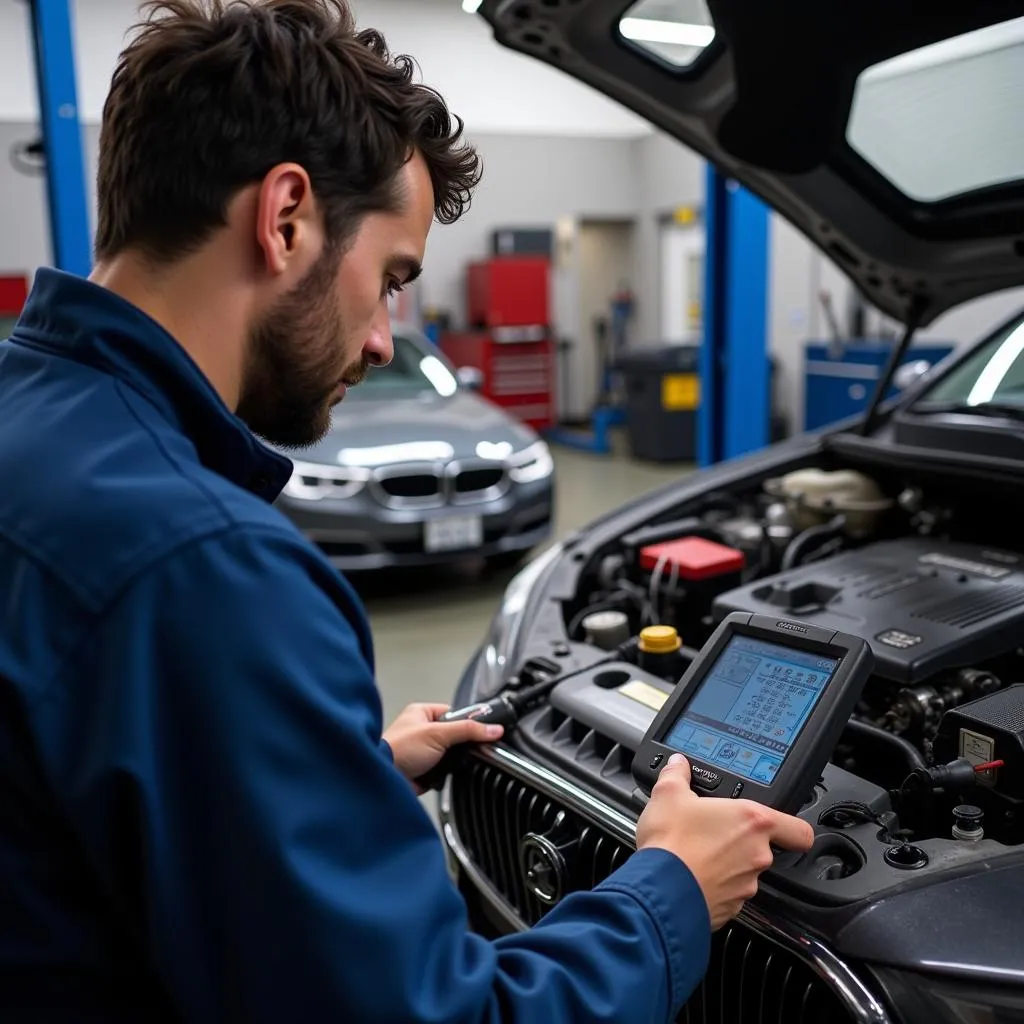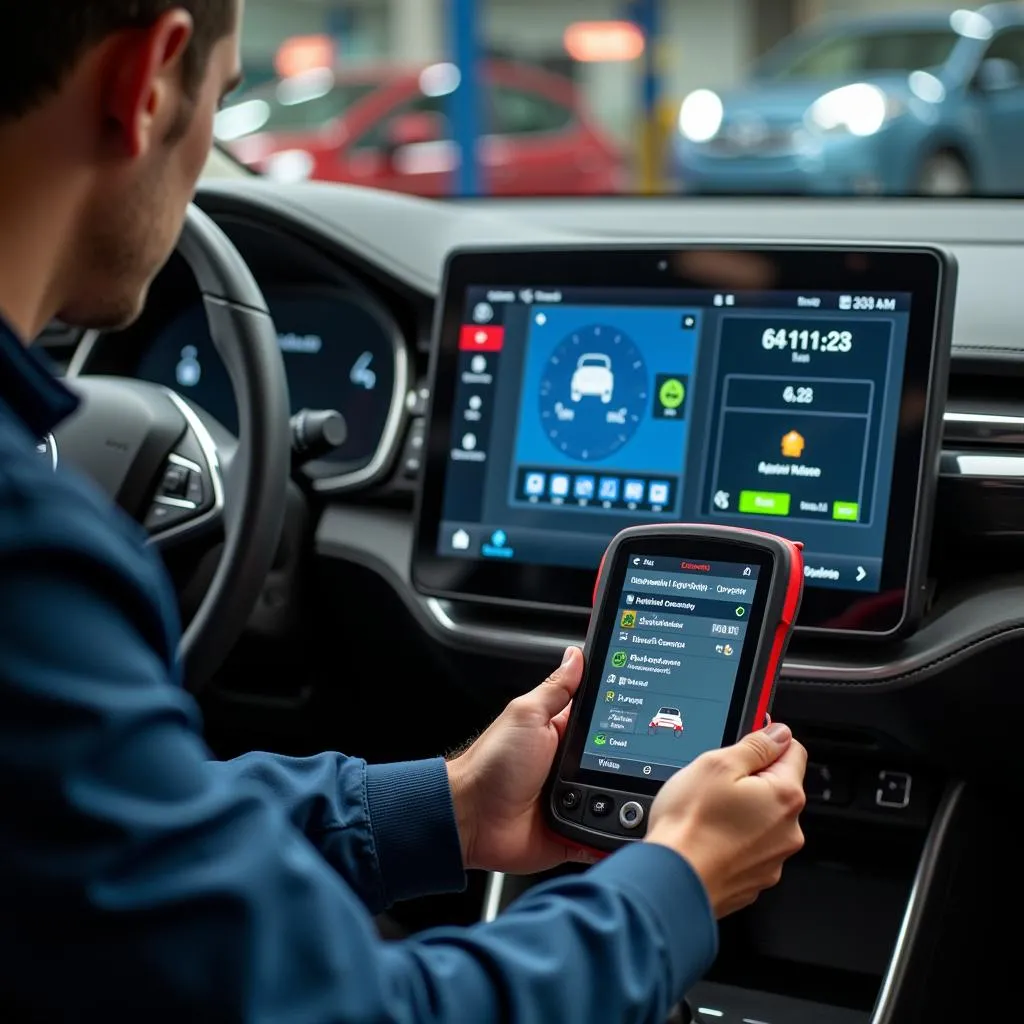The automotive industry is rapidly evolving, driven by technological advancements and a growing demand for skilled professionals. At the heart of this evolution lies the field of automotive diagnostics, where skilled technicians use sophisticated dealer scanners to identify and resolve complex vehicle issues. But what does a career in this exciting field entail? This career survey aims to provide a comprehensive overview of the skills, qualifications, and career paths available to aspiring automotive diagnostic technicians.
Navigating the World of Automotive Diagnostics
 Automotive Diagnostic Technician Using Dealer Scanner
Automotive Diagnostic Technician Using Dealer Scanner
Automotive diagnostics is the process of identifying and resolving problems in vehicles using advanced tools and techniques. Dealer scanners, the cornerstone of this process, are sophisticated devices that interface with a vehicle’s onboard computer system to retrieve diagnostic trouble codes (DTCs), monitor live data streams, and perform various tests.
Essential Skills and Qualifications for Automotive Diagnostic Technicians
A successful career in automotive diagnostics requires a unique blend of technical expertise, problem-solving skills, and a commitment to lifelong learning.
Technical Proficiency:
- Understanding of Automotive Systems: A strong foundation in automotive mechanics, electronics, and computer systems is crucial. Technicians need to understand the intricate workings of engines, transmissions, braking systems, and other critical vehicle components.
- Dealer Scanner Expertise: Proficiency in operating various dealer scanners is non-negotiable. Technicians should be comfortable navigating different scanner interfaces, interpreting DTCs, and utilizing advanced scanner functions to perform tests and calibrations.
- Diagnostic Skills: Effective diagnosis involves a systematic approach to problem-solving. Technicians must be able to gather information from various sources, analyze symptoms, and use logical reasoning to pinpoint the root cause of vehicle malfunctions.
Beyond Technical Skills:
- Communication Skills: The ability to communicate technical information clearly and concisely to both colleagues and customers is essential. Technicians need to explain complex repairs in a way that is easily understood, build rapport, and inspire confidence.
- Problem-solving Aptitude: Diagnostic challenges often require creative thinking and a willingness to explore multiple solutions. Technicians need to stay calm under pressure, adapt to unexpected findings, and persevere until a resolution is reached.
- Continuous Learning: The automotive industry is in a constant state of flux. New technologies emerge, vehicle models evolve, and diagnostic procedures are continually refined. A commitment to ongoing training and professional development is crucial for technicians to remain at the forefront of their field.
Charting Your Career Path in Automotive Diagnostics
The demand for skilled automotive diagnostic technicians continues to rise, offering a variety of career paths and growth opportunities for ambitious individuals.
Entry-Level Positions:
- Apprentice Technician: Starting as an apprentice provides valuable hands-on experience under the guidance of seasoned technicians.
- General Automotive Technician: Entry-level technicians often begin by performing routine maintenance and repairs before progressing to more complex diagnostic tasks.
Specializations and Advancement:
- Master Technician: With experience and advanced certifications, technicians can achieve Master Technician status, specializing in specific vehicle makes or diagnostic areas.
- Diagnostic Specialist: These highly skilled technicians focus exclusively on diagnosing complex vehicle issues, often working with the latest dealer scanner technology.
The Future of Automotive Diagnostics: Embracing the Technological Tide
 Electric Vehicle Diagnostics with Dealer Scanner
Electric Vehicle Diagnostics with Dealer Scanner
The future of automotive diagnostics is intricately linked to technological advancements, particularly in the realm of electric vehicles (EVs) and autonomous driving. As vehicles become increasingly complex and reliant on sophisticated software, the role of the diagnostic technician will continue to evolve.
“The automotive industry is on the cusp of a technological revolution,” says Emily Carter, Senior Automotive Engineer at DiagXcar. “Diagnostic technicians who embrace lifelong learning and adapt to these changes will be in high demand.”
Conclusion
A career in automotive diagnostics offers a rewarding path for individuals passionate about technology, problem-solving, and the ever-evolving automotive landscape. By acquiring the necessary skills, embracing continuous learning, and staying ahead of industry trends, aspiring technicians can carve out successful and fulfilling careers in this dynamic field.


